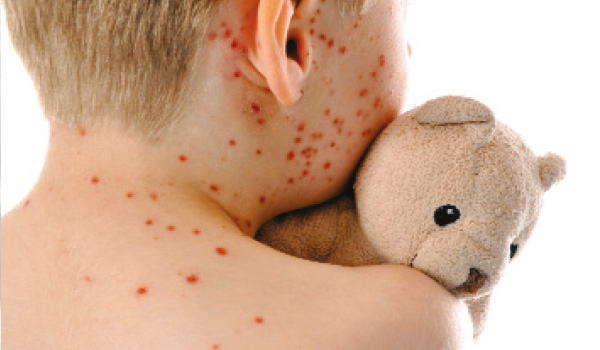Chickenpox: make the right choice
The varicella zoster virus infects thousands each year, yet as Dr Nadia Oozeerally explains, a simple vaccination will prevent it
What is Chickenpox?
Chickenpox is a highly contagious disease caused by the virus varicella zoster. In the UK, chickenpox is considered a mild and harmless infection of childhood. In reality, however, this “harmless” infection can be much more serious than most people realise.
How does chickenpox affect parents?
For parents, dealing with a child (or children) with chicken pox is often a major, unplanned disruption. There’s the stress of caring for a child with, on average, 300 extremely itchy spots all over their face and body, and the worry of permanent scarring. Add to this the fact that schools and nurseries often ban infected children, which forces parents to take a week off work, sometimes more if dealing with multiple infected siblings.

Is chickenpox dangerous?
Serious complications of the chickenpox infection include bacterial infections of the skin, pneumonia, inflammation of the brain (encephalitis), transient arthritis, blood stream infections (sepsis) and even death.
Women who have never had chickenpox before, and get chickenpox during pregnancy, can pass the infection to the developing baby, which can lead to fetal abnormalities. Newborns, in particular, are at risk of developing severe infection.
How can we prevent this disease?
The varicella vaccine was first created in 1974, and is safely used in many countries. It can be given to children from 12 months of age, as two separate injections, six weeks apart. If someone is unsure whether or not they have had chickenpox, they can still have the vaccine.
Does it work?
The recommended two doses of the vaccine are estimated to give 98% protection from chickenpox in children and 75% protection in adolescents and adults. A routine vaccination programme in the US reduced hospitalizations and deaths due to chickenpox by 80-90%. Even if the vaccine is given up to five days after exposure, evidence shows it can still prevent or reduce the severity of the symptoms.
So why aren’t we vaccinating in the UK?
In 2004, the World Health Organisation supported routine varicella vaccination for all healthy children between 12 and 18 months. Despite international support for varicella vaccination programmes, as well as studies proving the vaccine is longterm cost effective, the UK’s immunisation body last year decided against universal vaccination of children.
Can I get my child vaccinated?
Currently, the NHS only offers the varicella vaccine to certain high-risk groups, such as health-care workers, people with weakened immune systems or pregnant women who have developed no immunity to chickenpox and have been exposed. For peace of mind, parents can choose to have their child vaccinated privately.
If you wish to discuss vaccinating yourself or your child, or to book an appointment, please call Ashtead Hospital: 01372 221 400 or New Victoria Hospital: 020 8949 9640
Please note we only see patients 18 years old and over at Ashtead Hospital.

